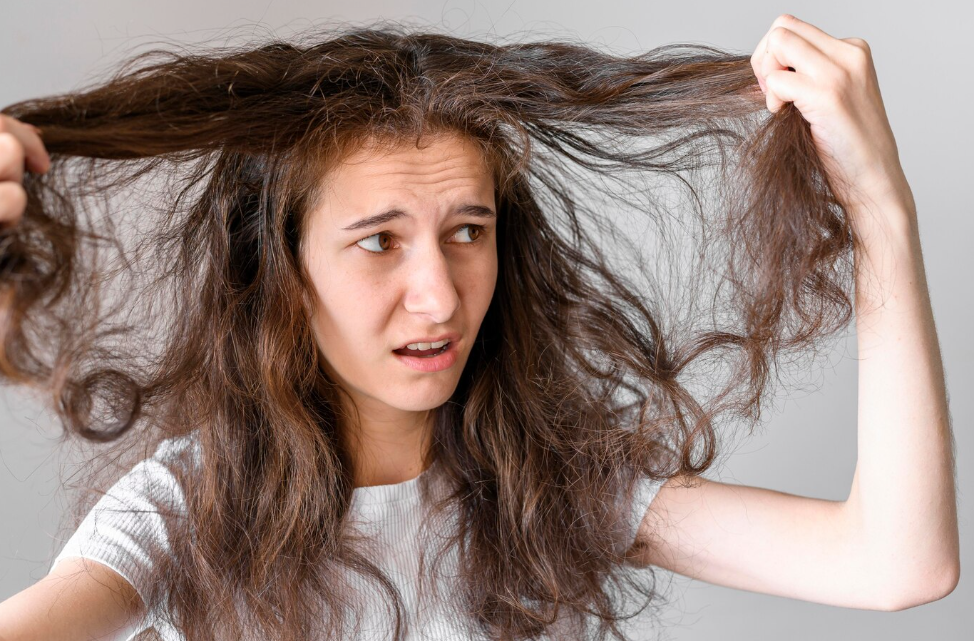Why is the scalp greasy and hair greasy and how to solve it

Dandruff and oily hair can be a source of distress for many, especially those with long hair. It not only causes discomfort but also leaves you with a feeling of unwelcome greasiness, diminishing confidence in social interactions despite your diligent daily hair washing routine. So, what causes the excessive production of oil on the scalp, and how can you address this issue? The answers lie right here in the following article
1. Dandruff Causes: Understanding the Origins of Oily Scalp
Oily scalp occurs when the sebaceous glands beneath the hair follicles produce an excess of natural oils. An abundance of these oils can lead to hair sticking together, coupled with the accumulation of dirt, fostering the growth of dandruff and causing scalp itchiness.
In the case of healthy hair, the production of excess oils is typically balanced, providing adequate moisture to the hair and protecting it from external factors that may damage it. The amount of sebum released by the hair follicles is also influenced by lifestyle, nutritional habits, hair care routines, and hair texture.
Dandruff Causes: Understanding Excessive Scalp Oil Production
The factors contributing to an overproduction of oil on the scalp may include:
- Overwashing and Hot Water Usage: Frequent hair washing, exceeding 4 times per week, can stimulate the hair follicles to produce more oil. Additionally, using hot water for hair washing can lead to dry scalp, prompting sebaceous glands to increase oil secretion to maintain moisture for the hair.
- Seborrheic Dermatitis: Also known as oily skin inflammation or scalp inflammation, seborrheic dermatitis describes a condition where the scalp becomes inflamed, characterized by the appearance of pinkish patches. Patients often experience discomfort, itching, and excessive oiliness in the hair.
- Unsuitable Hair Care Products: Products such as conditioners, shampoos, and hair treatments need to be carefully chosen to suit each individual’s scalp. Using products with strong cleansing or excessively moisturizing properties can disrupt the moisture balance, leading to oily scalp.
- Endocrine Disorders: Hormones play a crucial role in regulating oil production. During certain life stages, such as puberty, menstruation, premenopause, menopause, pregnancy, childbirth, and male andropause, hormonal changes can result in increased oil production.
2. Reducing Scalp Oiliness: Effective Strategies
Depending on the underlying causes of oily scalp, various remedies can be employed:
2.1. Adjusting Hair Washing Frequency
If you find yourself washing your hair too frequently (daily, for example), try reducing the frequency. This practice helps maintain healthy hair, minimizing excess oil, and promoting a healthier shine. Additionally, the water temperature during hair washing should be moderate, neither too hot nor too cold, to prevent scalp dryness.
In addition to reducing the frequency of hair washing, pay attention to the proper hair washing technique:
- Gently massage the scalp with moderate pressure, combining it with a soothing massage to reduce stress and avoid irritation to the scalp’s mucous membrane.
- Use an appropriate amount of shampoo and choose a type suitable for your scalp.
- Rinse your hair gently with water, ensuring all the lather is washed away, then pat your hair dry with a soft towel. Avoid using a hair dryer and let your hair dry naturally.
It’s essential to note the use of conditioner. While it can provide a smooth texture to your hair, it can also contribute to increased hair stickiness. Therefore, when applying conditioner, avoid direct contact with the scalp.
2.2. Regularly Clean Your Hairbrush
Dirt and excess oil can accumulate on your hairbrush. After each use, make sure to clean your hairbrush thoroughly for future use. Additionally, when brushing your hair, do so gently to avoid overstimulating the sebaceous glands under the hair follicles, which can lead to increased oil secretion.
2.3. Minimizing Heat Exposure and Using Hair Styling Products
Hair can be adversely affected by styling products and high temperatures. These products not only make hair brittle and prone to breakage but also strip natural moisture, prompting the scalp to produce more oil, resulting in greasy hair.
2.4. Combating Excess Oil and Hair Loss through Lifestyle Changes
You might be surprised to learn that your lifestyle can impact the regulation of oil in hair follicles. Maintaining a healthy lifestyle is crucial for various reasons, including hair health.
- Manage stress, balance emotions, and maintain a positive and relaxed mindset.
- Avoid frequent hair touching or rubbing hands on the head, as hands often harbor sweat, dirt, and bacteria.
- Choose a shampoo with oil-controlling ingredients, or consider switching to a natural herbal shampoo to avoid chemical impact and help maintain a stable pH level for the hair.
- Consider a reasonable hair washing schedule; daily washing may be suitable for those exposed to outdoor pollutants and sweat regularly.
- Adopt a balanced and nutritious diet, reducing oily and fatty foods, and incorporating more fresh vegetables and fruits.
- Seek medical advice for conditions affecting the ovaries, thyroid, or adrenal glands. Following the prescribed treatment plan can significantly improve oily scalp conditions.
- Protect hair from sunlight by using sunblock methods like hats or umbrellas whenever outdoors.
These suggestions aim to address oily scalp concerns at home. If, despite these efforts, symptoms persist, such as excessive hair loss, persistent itching, or inflammation, it is advisable to consult with a dermatologist.


